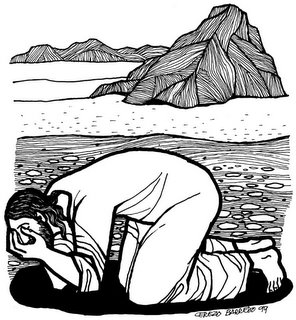
A sermon based upon John 2:13-22
In the name of Jesus; amen.
No more status quo.
The Temple was functioning at status quo. It was Passover and hundreds of thousands of people would have flocked to Jerusalem. It would have been like New Orleans on Mardi Gras or Times Square on New Year’s Eve. And they would have gone to the Temple to make necessary sacrifices.
But sacrifices cost money and the money that they would have had would have carried the image of human beings and couldn’t be used in the Temple. The money changers would have been necessary for the people to exchange the coins that they would have used to purchase the animals that would have been slaughtered.
Money changers were doing their job; they were status quo.
And in order to purchase an animal to have sacrificed, someone had to be there to sell them. The people who sold the cattle, sheep, and doves were doing their job; they were maintaining the status quo.
The fact is that there was little to get upset about with what was happening at the Temple. People were doing their jobs, pure and simple. There may have been corruption, but if so it was minor.
So why was Jesus so upset? What caused him to make a whip out of cords and drive these hard working people out of the Temple? What would have gotten him so mad that he would have turned over the money changer’s tables and spilled their coins?
Why wasn’t business as usual ok?
Last week I talked about being tested by all the things that are going on in the life of this congregation and yes, in my life too. I said it was time to tell Satan to get behind us, to go back to hell where he belonged.
Well, this week I want to tell you that sometimes God gets angry at the status quo, so angry in fact that he turns things upside down.
Last week I told you that we shouldn’t let what happens to us be the will of Satan, but the will of God. And I will say it again. Because Satan loves the status quo.
Last week I told you that the signs on the door of this church were demoralizing, this week I want to tell you that signs can change.
If Satan has been testing us, then God is turning things upside down and clearing away what wasn’t working in order for a new thing to happen.
This is the Christian story: “For the message of the cross is foolishness to those who are perishing, but to us who are being saved it is the power of God.”
It’s not an easy story; it’s not even always a happy story, but it is a story with a powerful ending.
It is the story of Lent; it’s a struggle through the wilderness where we are faced with wild animals, tempted by Satan, with nothing but rocks to eat and at the end of the wilderness is the cross where there is death.
But the story of Lent doesn’t end with the cross. It ends with Easter.
Jesus goes into the Temple, the place of worship at the most holiest of times and makes a BIG statement: No More Status Quo. And when the people want an explanation he tells them to “destroy this temple and in three days I will raise it up.”
And the people didn’t understand that he was talking about the Temple of his body.
Well, we are the body of Christ. The temple is us and we are a resurrection people. We proclaim Christ crucified and it is a crazy proclamation; it is a turn things upside down kind of proclamation because it says that we believe that God’s foolishness is smarter, that God’s weakness is stronger than any other wisdom or strength.
We believe that God makes new things happen.
We believe that God creates life out of nothing.
We believe that God changes death into resurrection.
God is leading us out of Egypt and the only place to go is the Promised Land.
Because the wilderness is not the last word and the cross is not the end of the story.
Jesus knew this and because of his knowledge the status quo was not enough. Jesus knew of the awesome possibilities that God makes possible and it consumed him with zealous fervor… it consumed him with trust in God, the one God, the God of miracles and deliverance.
It consumed him with desire to take the Temple beyond the status quo and into a radical, wonderful, new thing.
No more status quo; we are a resurrection people, the body of Christ himself.
Amen.





